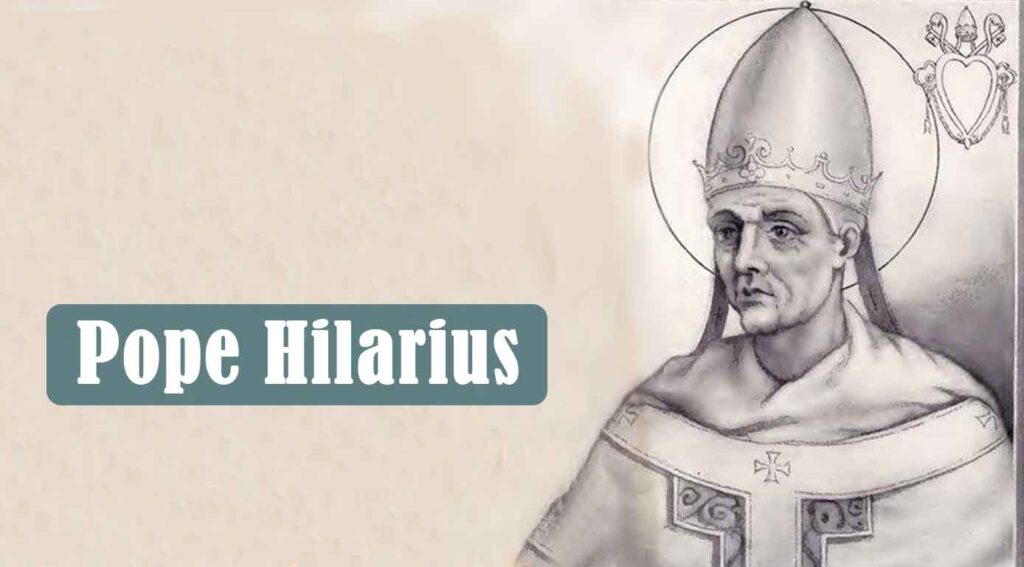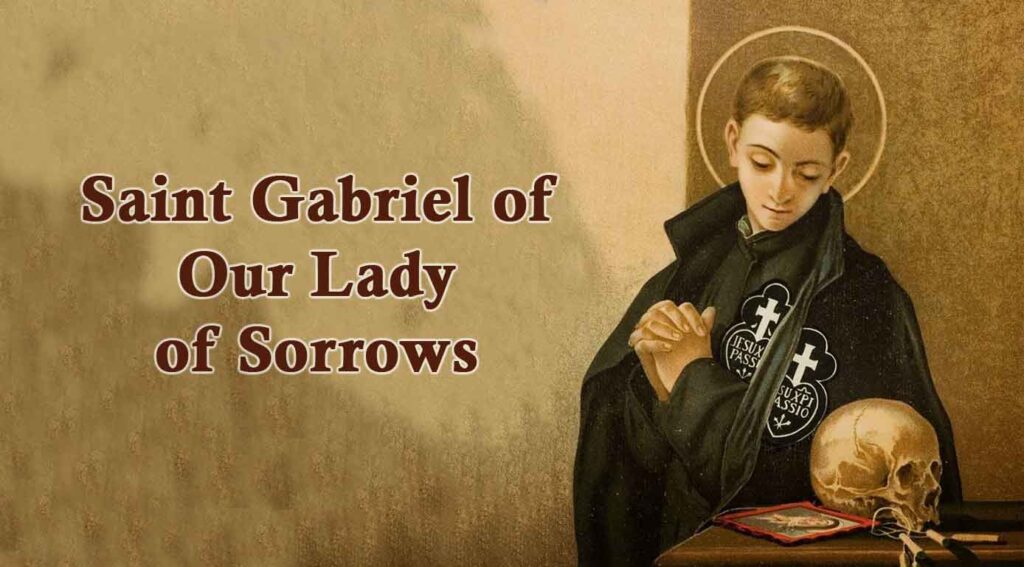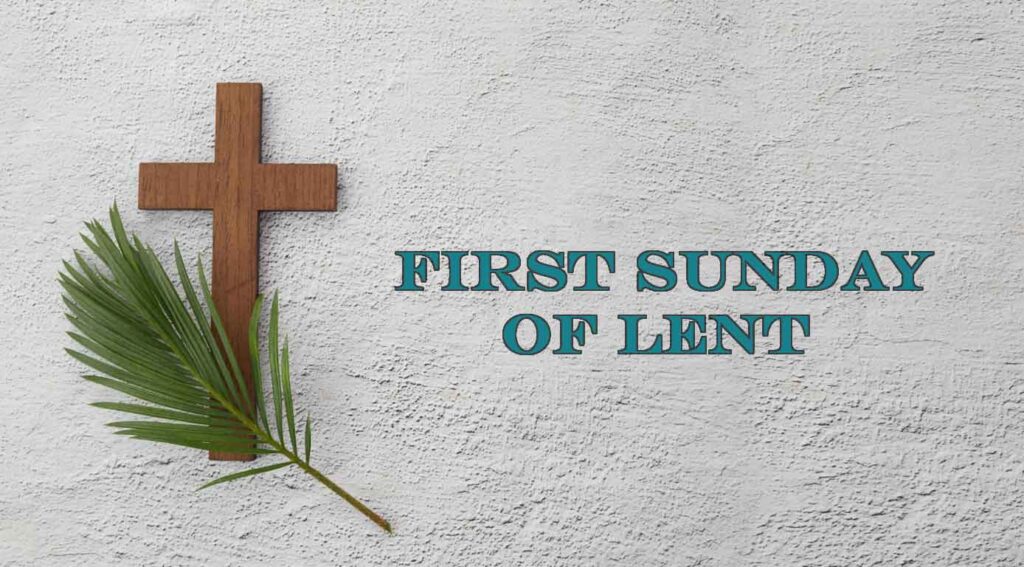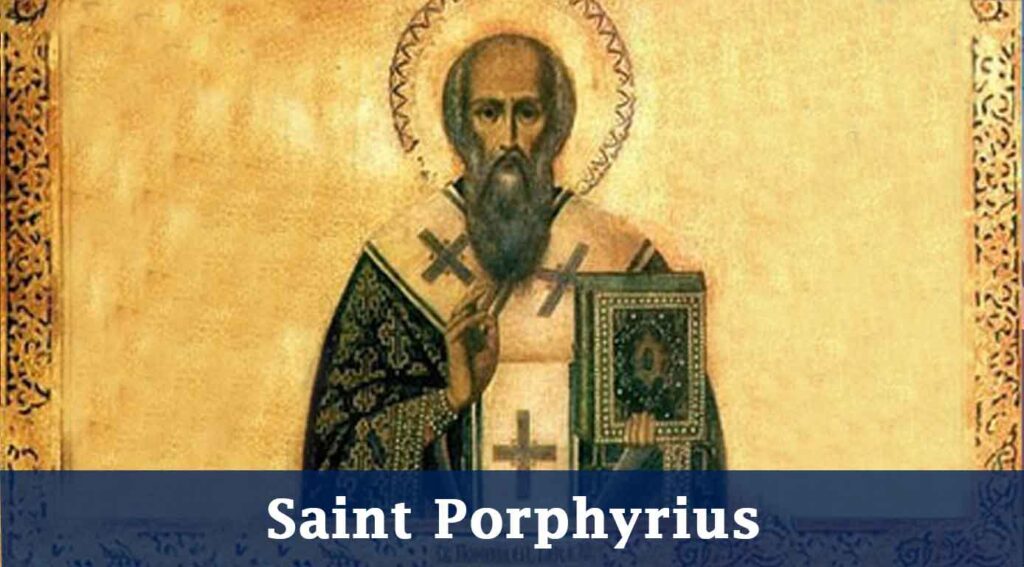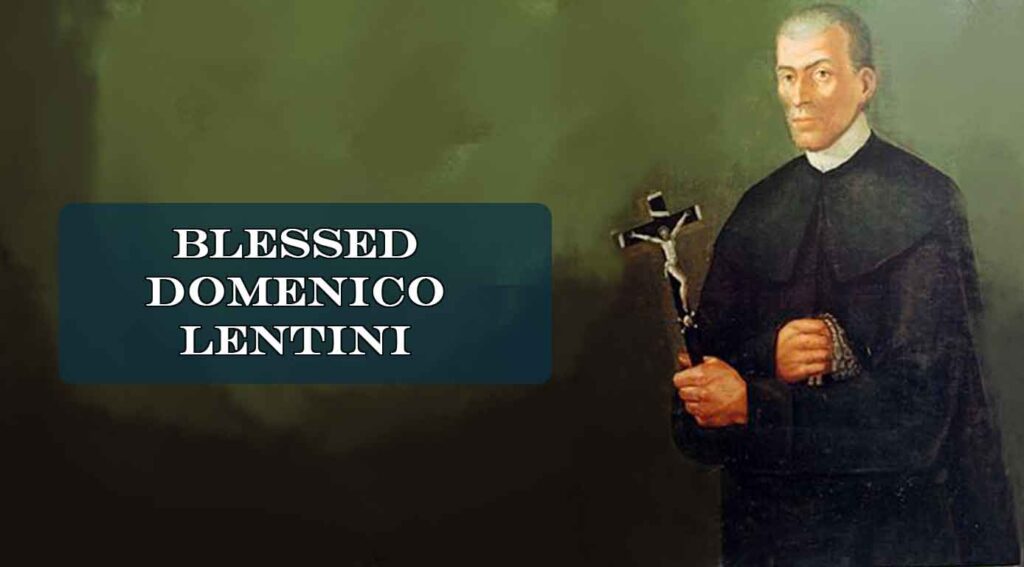Author name: sanjose
Pope Hilarius
Pope Hilarius was born in Sardinia. In 449, Hilarius served as a legate for Pope Leo I at the Second Council of Ephesus. His opposition to the condemnation of Flavian of Constantinople incurred the enmity of Dioscurus of Alexandria, who attempted to prevent him from leaving the city. Hilarius was able to make his escape and returned to Rome by an indirect route. He later erected an oratory at the Lateran in honor of John the Evangelist, to whom he attributed his safe passage.
As pope, he continued the policy of his predecessor, Leo I, who, in his contest with Hilary of Arles, had obtained from Emperor Valentinian III a famous rescript of 444 (called Novel 17) confirming the supremacy of the bishop of Rome. Hilarius continued to strengthen ecclesiastical government in Gaul and Spain.
In Rome, Hilarius worked zealously to counter the new emperor’s 467 edict of toleration for schismatic sects, which had been inspired, according to a letter of Pope Gelasius I, by a favourite of Emperor Anthemius named Philotheus, who espoused the Macedonian heresy. On one of the emperor’s visits to St Peter’s Basilica, the pope openly called him to account for his favourite’s conduct, exhorting him by the grave of St Peter to promise that he would allow no schismatical assemblies in Rome.
He was the bishop of Rome from 19 November 461 to his death on 29 February 468.
Sources:
https://en.wikipedia.org/wiki/Pope_Hilarius
Alban Butler, Paul Burns. Butler's Lives of the Saints: February, p. 266. A&C Black, 1995
https://www.catholic.org/saints/saint.php?saint_id=3774
Ephesians 5:25-26
Verse:
“Husbands, love your wives, just as Christ loved the church and gave himself up for her to make her holy, cleansing her by the washing with water through the word.” - Ephesians 5:25-26
Prayer to Love God Above All Things
God, my Father, may I love You in all things and above all things. May I reach the joy which You have prepared for me in Heaven. Nothing is good that is against Your Will, and all that is good comes from Your Hand. Place in my heart a desire to please You and fill my mind with thoughts of Your Love, so that I may grow in Your Wisdom and enjoy Your Peace.
Saint Gabriel of Our Lady of Sorrows
Born in Italy into a large family and baptized Francis, Saint Gabriel lost his mother when he was only four years old. He was educated by the Jesuits and, having been cured twice of serious illnesses, came to believe that God was calling him to the religious life. Young Francis wished to join the Jesuits but was turned down, probably because of his age, not yet 17. Following the death of a sister to cholera, his resolve to enter religious life became even stronger and he was accepted by the Passionists. Upon entering the novitiate he was given the name Gabriel of Our Lady of Sorrows.
Ever popular and cheerful, Gabriel quickly was successful in his effort to be faithful in little things. His spirit of prayer, love for the poor, consideration of the feelings of others, exact observance of the Passionist Rule as well as his bodily penances—always subject to the will of his wise superiors— made a deep impression on everyone.
His superiors had great expectations of Gabriel as he prepared for the priesthood, but after only four years of religious life symptoms of tuberculosis appeared. Ever obedient, he patiently bore the painful effects of the disease and the restrictions it required, seeking no special notice. He died peacefully on February 27, 1862, at age 24, having been an example to both young and old.
Saint Gabriel of Our Lady of Sorrows was canonized in 1920.
Sources:
https://www.franciscanmedia.org/saint-of-the-day/saint-gabriel-of-our-lady-of-sorrows/
Saint Gabriel of Our Lady of Sorrows Read More »
First Sunday of Lent
Liturgy of the Word
First Reading: Gn 2:7-9, 3:1-7
The LORD God formed man out of the clay of the ground
and blew into his nostrils the breath of life,
and so man became a living being.
Then the LORD God planted a garden in Eden, in the east,
and placed there the man whom he had formed.
Out of the ground the LORD God made various trees grow
that were delightful to look at and good for food,
with the tree of life in the middle of the garden
and the tree of the knowledge of good and evil.
Now the serpent was the most cunning of all the animals
that the LORD God had made.
The serpent asked the woman,
"Did God really tell you not to eat
from any of the trees in the garden?"
The woman answered the serpent:
"We may eat of the fruit of the trees in the garden;
it is only about the fruit of the tree
in the middle of the garden that God said,
'You shall not eat it or even touch it, lest you die.'"
But the serpent said to the woman:
"You certainly will not die!
No, God knows well that the moment you eat of it
your eyes will be opened and you will be like gods
who know what is good and what is evil."
The woman saw that the tree was good for food,
pleasing to the eyes, and desirable for gaining wisdom.
So she took some of its fruit and ate it;
and she also gave some to her husband, who was with her,
and he ate it.
Then the eyes of both of them were opened,
and they realized that they were naked;
so they sewed fig leaves together
and made loincloths for themselves.
Responsorial Psalm: Psalm 51:3-4, 5-6, 12-13, 14 and 17
Response– Be merciful, O Lord, for we have sinned
Have mercy on me, O God, in your goodness;
in the greatness of your compassion wipe out my offense.
Thoroughly wash me from my guilt
and of my sin cleanse me.
R– Be merciful, O Lord, for we have sinned
For I acknowledge my offense,
and my sin is before me always:
"Against you only have I sinned,
and done what is evil in your sight."
R– Be merciful, O Lord, for we have sinned
A clean heart create for me, O God,
and a steadfast spirit renew within me.
Cast me not out from your presence,
and your Holy Spirit take not from me.
R– Be merciful, O Lord, for we have sinned
Give me back the joy of your salvation,
and a willing spirit sustain in me.
O Lord, open my lips,
and my mouth shall proclaim your praise.
R– Be merciful, O Lord, for we have sinned
Second Reading: Rom 5:12-19
Brothers and sisters:
Through one man sin entered the world,
and through sin, death,
and thus death came to all men, inasmuch as all sinned—
for up to the time of the law, sin was in the world,
though sin is not accounted when there is no law.
But death reigned from Adam to Moses,
even over those who did not sin
after the pattern of the trespass of Adam,
who is the type of the one who was to come.
But the gift is not like the transgression.
For if by the transgression of the one, the many died,
how much more did the grace of God
and the gracious gift of the one man Jesus Christ
overflow for the many.
And the gift is not like the result of the one who sinned.
For after one sin there was the judgment that brought condemnation;
but the gift, after many transgressions, brought acquittal.
For if, by the transgression of the one,
death came to reign through that one,
how much more will those who receive the abundance of grace
and of the gift of justification
come to reign in life through the one Jesus Christ.
In conclusion, just as through one transgression
condemnation came upon all,
so, through one righteous act,
acquittal and life came to all.
For just as through the disobedience of the one man
the many were made sinners,
so, through the obedience of the one,
the many will be made righteous.
Verse Before the Gospel: Mt 4:4b
One does not live on bread alone, but on every word that comes forth from the mouth of God.
Gospel: Mt 4: 1-11
A reading from the holy Gospel according to Matthew
At that time Jesus was led by the Spirit into the desert
to be tempted by the devil.
He fasted for forty days and forty nights,
and afterwards he was hungry.
The tempter approached and said to him,
"If you are the Son of God,
command that these stones become loaves of bread."
He said in reply,
"It is written:
One does not live on bread alone,
but on every word that comes forth
from the mouth of God."
Then the devil took him to the holy city,
and made him stand on the parapet of the temple,
and said to him, "If you are the Son of God, throw yourself down.
For it is written:
He will command his angels concerning you
and with their hands they will support you,
lest you dash your foot against a stone."
Jesus answered him,
"Again it is written,
You shall not put the Lord, your God, to the test."
Then the devil took him up to a very high mountain,
and showed him all the kingdoms of the world in their magnificence,
and he said to him, "All these I shall give to you,
if you will prostrate yourself and worship me."
At this, Jesus said to him,
"Get away, Satan!
It is written:
The Lord, your God, shall you worship
and him alone shall you serve."
Then the devil left him and, behold,
angels came and ministered to him.
The Readings and Gospel were sourced from:
First Sunday of Lent Read More »
Isaiah 30:18
Verse:
“Yet the Lord longs to be gracious to you; therefore he will rise up to show you compassion.
For the Lord is a God of justice. Blessed are all who wait for him!” - Isaiah 30:18
Grace Before and After Meals
Before: Bless us, O Lord! and these Thy gifts, which we are about to receive from Thy bounty, through Christ our Lord.
Amen.
After: We give Thee thanks for all Thy benefits, O Almighty God, who livest and reignest world without end. Amen. May the souls of the faithful departed, through the mercy of God, rest in peace. Amen.
Saint Porphyrius
Saint Porphyrius was bishop of Gaza from 395 to 420, known, from the account in his Life, for Christianizing the recalcitrant pagan city of Gaza, and demolishing its temples.
Saint Porphyrius was appointed bishop at the age of 45. He sent Marcus, his deacon and chronicler, to Constantinople in 398 to obtain an order to close the pagan temples of Gaza. An official named Hilarius duly arrived with soldiers to close the temples, but the Marneion remained open because Hilarius was bribed with a large sum of money (Vita 27). There was no great change, however, in the attitude of the people, who refused to allow Christians “to hold any civil office, but entreated them as naughty slaves”. He then went to Constantinople during the winter of 401–402, accompanied by the bishop of Caesarea Palaestina, and together they convinced the Empress Eudoxia.
The saint’s body is said to be buried in Saint Porphyrius’ Church, in Gaza City, in the State of Palestine.
Proverbs 29:23
Verse:
“Pride brings a person low, but the lowly in spirit gain honor.” - Proverbs 29:23
Prayer for Gods Guidance
Father in Heaven, You made me Your child and called me to walk in the Light of Christ. Free me from darkness and keep me in the Light of Your Truth. The Light of Jesus has scattered the darkness of hatred and sin. Called to that Light, I ask for Your guidance. Form my life in Your Truth, my heart in Your Love. Through the Holy Eucharist, give me the power of Your Grace that I may walk in the Light of Jesus and serve Him faithfully.
Blessed Domenico Lentini
Saint Domenico Lentini was born on 20 November 1770 in Lauria. He was an Italian Roman Catholic priest.
In 1785 he felt a call to become a priest and he commenced his ecclesial studies alongside Giuseppe Ielpo who entered just a few months prior to him. Giuseppe would later become Lentini’s confessor.
Lentini was ordained as a priest in 1794 and served as a life-long parish priest in his hometown of Potenza where he dedicated himself to promoting Eucharistic devotion and to working alongside the poor of his area. But he also fostered a deep dedication to education and evangelization and often taught parishioners catechism and literature while also making himself available to hear the confessions of penitents.
He turned his home into a school where he taught theological studies and catechism to parishioners as well as other subjects such as literature. He taught such subjects to people with no need for compensation. Lentini often subjected himself to penitential practices and he sometimes deprived himself of nourishment in the spirit of living in total and constant penance with the corporal mortification of the flesh and sleeping of the floor.
In February 1828 he was before the Eucharist when he suffered a sudden and severe pain that forced him to his bed.He died on 25 February 1828 in his home in the evening around 8:30pm with a reputation for saintliness. He died with a crucifix in hand and a lighted candle at his side
Blessed Domenico Lentini Read More »
Luke 1:37
Verse:
“For no word from God will ever fail.” - Luke 1:37
Prayer For Courage
Dear God, give me courage,
for perhaps I lack it more than anything else.
I need courage before men against their threats
and against their seductions.
I need courage to bear unkindness,
mockery, contradiction.
I need courage to fight against the devil,
against terrors and troubles, temptations,
attractions, darkness and false lights,
against tears, depression, and above all fear.
I need Your help, dear God.
Strengthen me with Your love and Your grace.
Console me with Your blessed Presence
and grant me the courage to persevere
until I am with You forever in heaven.



